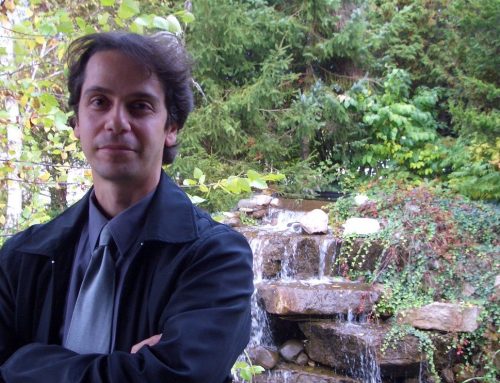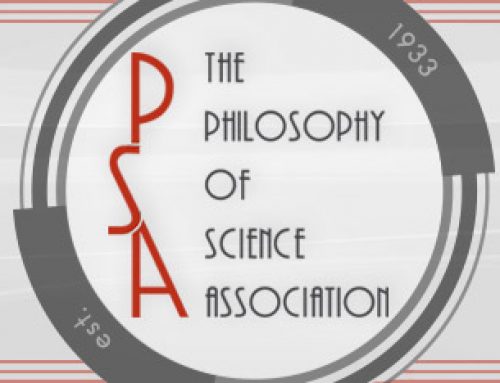By Wayne Myrvold
There has been a bit of squabbling, of late, between physicists and philosophers of science. In 2010, in their book The Grand Design, Stephen Hawking and Leonard Mlodinow. declared that “philosophy is dead … Scientists have become the bearers of the torch of discovery in our quest for knowledge. More recently, the physicist Lawrence Krauss, responding to a review of his book A Universe From Nothing?, by David Albert (who has a Ph.D. in physics and a career as a philosopher of physics), spoke disparagingly of “moronic philosophers.”
Since I am a philosopher by profession, it may come as a surprise when I say that some of what Hawking and Mlodinow say is correct. But it turns on a matter of terminology. The term “philosophy” used to be used more broadly than it is now. What the ancient Greeks counted as philosophy included what we now regard as natural science, in addition to logic, ethics, theology, and… well, everything that Aristotle wrote about. What happened, historically, was that, as subfields of what was called “philosophy” became more established, achieved solid results that were widely accepted among those who worked in that field, we stopped calling them philosophy. The quest for the sorts of knowledge that Hawking and Mlodinow are talking has passed from people called philosophers to people called scientists, not because one group failed and had to pass on the torch, but because we started calling that quest “science,” rather than philosophy.
One activity that used to be part of philosophy was the quest for substantive truths about the way the world is, achieved without input from observation and experiment, by sitting and thinking about the way things must be. If Hawking and Mlodinow are proclaiming the death of that enterprise, then I for one will help them bury it.
Physicist Jim Holt, in his commentary on the kerfuffle, defends philosophy by pointing out that the atomic hypothesis was proposed, long ago, by the pre-Socratic philosophers Leucippus and Democritus, and remarks, “And they didn’t come up with it by doing experiments.” If the suggestion is that Leucippus and Democritus generated knowledge of atoms from mere thought, and that this is a role that philosophy can continue to play, then this is wrong, I think. Leucippus and Democritus were speculating. There were also philosophers at the time who speculated that the world is a continuum. Throw enough speculations into the air, and some of them will almost inevitably resemble something in modern science. It is a mistake, I think, to see modern atomism as a vindication of Democritus; the work that led to the acceptance of atoms in the scientific community was very much driven by experiment. If the suggestion is that speculation is valuable because it can generate hypotheses to be tested by science, this is an ill-chosen example. If you look at the experimental phenomena that led Dalton to the atomic hypothesis, it is clear that the phenomena themselves so strongly suggest the hypothesis that it didn’t really matter whether Democritus or anyone else had thought of it before. More on that in another post, if anyone is interested.
Philosopher Gary Gutting’s response to Krauss, in its final paragraphs, suggests that there are some questions that science can’t answer. This is a misleading way of putting it, I think, as it carries the suggestion that there are domains of reality that are forever blocked off from scientific inquiry. Less misleading is to point out that there are certain questions—and, in particular, some questions about science—that we regard as philosophical questions. If you ask a philosophical question, and offer an answer to it, you’re engaging in philosophy, whether your day job is doing science or philosophy. And it’s trivially true that if, when asking and answering certain questions, we call what you are doing philosophy, not science, then there are some questions that can’t be answered by science. But there’s nothing deep about that; it’s a matter of the terminology we use to distinguish between different sorts of intellectual pursuits.
Our terminological distinction between “science” and “philosophy” is a comparatively recent invention. Many of the thinkers of the past that we now regard as great scientists would have described themselves as philosophers. Moreover, if we look at what they did, and apply our distinctions, we typically find that some of what they did is what we now call science, and some of it, what we now call philosophy.
Take Sir Isaac Newton, for example. His magnum opus, one of the founding works of modern physics, was entitled Philosophiae Natu
ralis Principia Mathematica, or Mathematical Principles of Natural Philosophy. Most of the book is concerned with what we now regard as physics. But he also engages in what we would now call philosophy of physics.
One place in which he does so is a digression, (“Scholium” is Newton’s word), immediately after he lays out his Laws of Motion. In this Scholium Newton steps back and discusses the concepts of space and time that are, in his view, requisite for making sense of the laws of physics. This sort of question is the sort that we now recognize as a philosophical question, and much of the current discussions in the philosophy of space and time trace their origins to this issues raised in Newton’s Scholium, which is so widely quoted in the philosophical literature on space and time that I suspect that most philosophers who work in that area know it by heart.
My own work consists, in part, of addressing the question, “What is the empirical success of quantum theory telling us about the world?” This is a question that physicists don’t have to ask. Much of the work done by physicists can proceed without an answer to this question. Moreover, a case can be made, I think, that there have been moments in the development of quantum mechanics when progress was made by setting aside this question, at least temporarily. But they can ask this question, and many of them do. When they do so, they are engaged in philosophy of physics.
Obviously, to engage questions like this in a fruitful way requires knowledge of the relevant physics. Moreover, it requires knowledge of the bits of physics most relevant to the question, some of which is not part of the standard training of a physicist. And to do it well requires familiarity with the history of discussions on this topic, and also with some broader philosophical issues. Which means: constructive engagement with questions such as these requires stepping beyond the bounds of the usual training of philosophers, and also beyond the bounds of the usual training of physicists. Some of the people engaged in this pursuit began their careers as physicists, some, as philosophers. The ideal education for a philosopher of physics would be two PhDs, one in physics, and one in philosophy. There are a few dual PhDs, and these include some of the finest philosophers of physics around, but most people aren’t willing to spend that much time in graduate school.
When I think of people who have thought deeply about the foundations of quantum mechanics, and who have contributed most to our understanding of its implications, two names stand out. One is Albert Einstein. Forget the popular myth that he disliked quantum mechanics, or that he was too old-fashioned to accept its implications, or that he spent the latter part of his career trying to refute quantum mechanics; all that is completely false. Careful reading of what he wrote about quantum mechanics reveals that he understood the theory; moreover, a case can be made that Einstein’s writings led to increased understanding of how the theory works. The second name is a physicist who took Einstein’s writings on QM as his point of departure, John S. Bell. Einstein was, of course, one of the greatest physicists of the 20th century. Bell’s primary work was in particle physics; philosophy of quantum theory was, in effect, a hobby for him.
Though few people have advanced training in more than one field, there’s a substitute for polymathery: interaction between people with different specialized backgrounds. Last month I was at a conference, held in Washington DC, called “New Directions in Foundations of Physics.” This is part of an annual series organized by a consortium of philosophers in the DC area, which bring together physicists, philosophers, and historians of physics. Though there are, of course, cultural differences among these disciplines, the commonalities outweigh the differences, and I can see no point in erecting disciplinary boundaries. There are certain kinds of questions that are profitably discussed by exactly such a group. Of course, it requires willingness to make the effort to understand each other, and there is no place in philosophy of physics for philosophers who aren’t willing to learn any physics.
Philosophy of science isn’t going to go away, and wouldn’t go away even if we went back to the model, prevalent prior to the second half of the twentieth century, in which it has no existence as a distinct subdiscipline of philosophy and is practiced primarily by scientists in their spare time. Most of the really revolutionary developments in physics were made by philosophically reflective physicists. But the deepest insights into the meaning of quantum mechanics have come from people primarily known as physicists. This is something we philosophers of physics should simply acknowledge, and take from it the lesson: what is needed is less attention to disciplinary boundaries, not a more sharply demarcated domain of our own where we rule as sovereigns.
So let’s stop the preening and posturing about whose discipline is better, and get on with understanding what science is telling us about the world.




